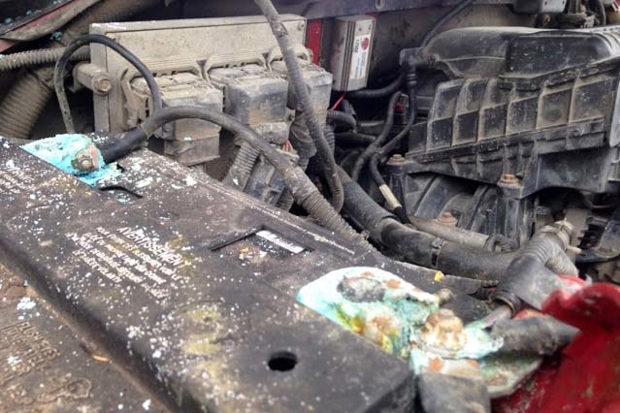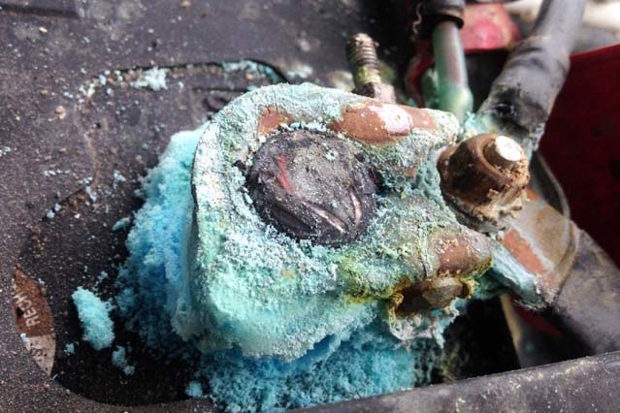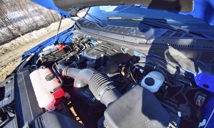Welcome to Goof of the Month! Every month, we ask for stories from our network of mechanic pals that highlight the need to understand one’s vehicle, how to maintain it, and how it works. We read the submissions, check out the stories, and pick the winner, announcing the monthly Goof in our regular column about the most mechanically declined folks on the road today.
This month’s genius came to us from mechanic Paul Kennaley, of Sudbury, Ontario, who reports that his client got fed up of non-functioning electronic accessories, became irritated, and finally caved, bringing his ride in for a check.
The Complaint
This customer brought his Ford F-150 in without a focused complaint. He was experiencing numerous electronics related issues, ranging from non-functioning door locks that would get stuck trying to lock and unlock, sporadic activation of his alarm system, headlight flickering, and even random check-engine lights. A whole smattering of electronics issues were present, rearing their ugly heads.

The Mechanic
“This isn’t totally uncommon, but you don’t usually see so many problems like this occurring all at once,” said Kennaley. “This guy was really ticked off, and said he was ready to sell his truck for scrap value. He’d had enough. So I told him to leave it for a day and we’d take a look. Problems like this, especially when they present themselves across a number of systems, can be a real pain for the customer, and a real pain for us mechanics to track down. We call these ‘gremlins’. I started with the usual stuff—8 times out of 10, it’s a bad ground between a main computer module and the truck’s frame. These can rust out, corrode, and fail to ground, or fail to ground properly. Thing is, new vehicles have dozens of grounds, and the trouble is to find the right one”.
The Diagnosis
After planning to check out over a dozen body grounds for integrity, Kennaley popped the hood and discovered the real issue causing the problem.
“This was a real head-shaker,” he said. “I hadn’t planned on checking the battery from the go, because even on a good day, sometimes I forget that customers don’t realize to check the simple stuff out first. In this case, it was a simple fix, visible the instant I opened the hood. This guy’s battery terminals were absolutely caked with corrosion.”

The battery terminals on this F-150 were absolutely plastered with corrosion and contaminants that had built up over time. These can prevent the proper amount of power from reaching vital vehicle components, causing a world of issues.
“New vehicles are fussy about getting the proper amount of voltage,” Kennaley comments. “If you’ve got a weak battery, or a battery that’s performing poorly because of deposits like these, the other electronics in the vehicle can start acting up and causing problems. In some cases, we’ve even seen deposits like this causing the battery to discharge itself, resulting in a dead battery.”
The Outcome
This is a simple fix. Kennaley fixed the customer’s plethora of electrical issues by removing the battery terminals, cleaning the crud away with a wire-brush, applying some dielectric grease (a special protective lubricant for electrical components) to the terminals to help fend off future contamination, and re-installing the battery cables. Then, it was all systems go.
“It’s funny because the problems can be so severe and frustrating, but the fix is so easy when it’s caused by battery gunk,” Kennaley adds.
“This was a long-time customer of ours, and we know him well. He came back in and we told him everything was fixed, and had a little fun with him when he asked about the bill. It only took about 2 minutes to fix the problems, so actually, we didn’t even charge him. He came back with coffees later, so all was well.”

Lesson Learned
Over time, some fancy science stuff can cause salt and other contaminants in the atmosphere to congregate on the terminals of a vehicle’s battery via a chemical reaction caused by the presence of electricity and metal and salt in the air. You’re supposed to clean your battery terminals a few times a year, in particular just before and just after winter. Otherwise, you wind up with battery terminals like those on this fella’s F-150, caked in crud, with a variety of electrical issues, or in some cases, even a dead battery.

